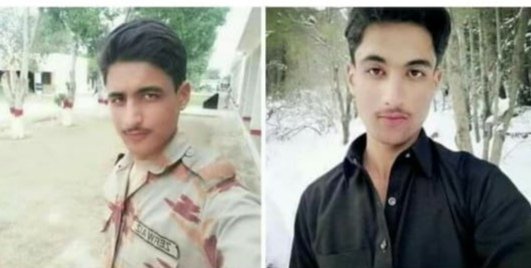The strategy of deploying Pashtuns in war zone of occupied Balochistan by Pakistan’s Punjabi Generals has begun to backfire. The young Pashtun boys who are forcibly sent to the inhospitable terrains of Balochistan live in a constant fear of sniper attacks by the Balochistan Sarmachars (freedom fighters) and suffer ill-treatment at the hands of their seniors. This has turned them into emotional wrecks. In their desperation these Pashtun soldiers are committing suicide.
Over the past few days two junior officers of the Pakistan military committed suicide in Kech district of occupied Balochistan. Local sources told this reporter that one Pakistani soldier committed suicide at Gomazi Bunpir area of Kech and another killed himself at Tump in Kech district.
This could have major ramifications for Pakistan’s political stability and can soon snowball into a serious political issue in Pakistan’s north where the Pashtun Tahafuz Movement (PTM) is gaining momentum with each passing day. Ali Wazir, a prominent leader of the Pashtun Tahafuz Movement (PTM) and member of the Pakistan Quami Assembly minced no words and wrote on the micro-blogging platform Twitter that young Pashtun boys of tender age are being recruited in the Frontier Corps and forcibly sent to dangerous areas of occupied Balochistan amidst an ongoing war between Baloch freedom fighters and Pakistani forces. Ali Wazir also shared the photograph of a young Pashtun boy who committed suicide in the Quroai, Dera Ismail Khan region who was on duty on occupied Balochistan.
A Pakistani police officer speaking strictly on condition of anonymity told this reporter that incidents of suicide has increased amongst Pakistani soldiers posted in Awaran, Bolan, Panjgur, Kech and Sibbi. The police officer added that they have been highlighting these suicide incidents in their “internal reports” being sent to the higher authorities in Islamabad. “We have clearly written that tremendous stress is one of the primary reason for suicides. But there has been no reply,” the police officer said. “…the Baloch Sarmachars (freedom fighters) have changed their combat strategy. They now carry out sniper attacks with precision, which means all Pakistani soldiers posted in Balochistan have a continuous threat to their lives. A large majority of these are Pashtuns who are unable to cope with the stress of war… and due to this extreme stress they are resorting to suicides,” the Pakistani police officer explained.
There has been a marked increase in the sniper attacks by Baloch freedom fighters in Kech, Awaran and Panjgur and several dozens of Pakistani soldiers have lost their lives during the last few months.
The occupied Balochistan consists of extremely difficult inhospitable terrain and comprises vast swathes of rocky mountainous topography where these young and ill-trained Pashtun boy-soldiers are forcibly sent. These soldiers remain under continuous threat of falling prey to a sniper bullet whenever they step out of their bunkers. And so they have to live in a constant state of fear and mental stress of being killed by Baloch Sarmachars (freedom fighters). And it does not end here. Once these hapless boy-soldiers from Pashtunistan come to the dangerous war zone in occupied Balochistan they are made to stay in the inhospitable terrain for several months and denied leave to visit their family in Pashtunistan. Their leave gets cancelled or is delayed for several months apart from being denied other facilities that the Punjabi soldiers enjoy in Rawalpindi.
A mid-rank military officer in the Pakistan Army who spoke strictly on condition of anonymity explained that Punjabi Generals of Pakistan Army deploy a large number of Pashtuns only in those areas of Balochistan that are dangerous and where intense war is on. “Around 90% soldiers being deployed in high combat zones are Pashtuns,” the mid-rank Pakistan Army officer said. He corroborated all that was said by the police officer (quoted above) about stress-related suicides amongst Pakistani soldiers.
In fact, a look at the ethnic profile of Pakistan Army does prove that its creamy layer comprises only of Punjabi Generals who exploit the foot soldiers and use them as cannon fodder, a large segment of whom are Pashtuns that hail from Waziristan.
It’s just a matter of time when Pashtuns turn against the Punjabi Generals of Pakistan Army and revolt. Pashtuns will then fight for their own community, an independent identity and an independent nation. The rapid rise of Pashtun Tahafuz Movement (PTM) across the northern frontiers of Pakistan in Waziristan point towards this impending outcome.
Balochistan has only been a money minting zone for the Punjabi Pakistani Generals who are now using Pashtuns as cannon fodder to loot the region’s rich natural resources. The Baloch Sarmachars (freedom fighters), on their part, are fighting for the independence of their motherland Balochistan. Pashtuns have begun to understand the real context of ongoing war in occupied Balochistan and are questioning the bloodshed of Baloch freedom fighters. Pashtun leaders are now getting vocal by each passing day as to why should young boys of tender age be sent to die at the hands of sniper attacks by Baloch Sarmachars.
Pashtun boy-soldiers know that they are unnecessarily sucked in this war where they get brutally exploited by the Punjabi Generals of Pakistan Army, fall prey to Baloch Sarmachar sniper bullets, and/or turn into an emotional wreck and ultimately commit suicides. Ironically, the United Nations and other international human rights organisations that are quite vocal about other conflict zones seem to conveniently forget about Pakistan’s illegal occupation of Balochistan and the decades long war that has led to the death of thousands of people.

